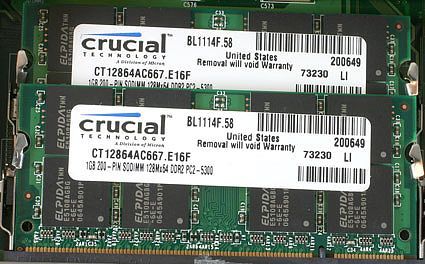RAM Prices Could Drop 20 Percent This Quarter - Research
In a new report this week, DRAMeXchange, a division of TrendForce, said it expects DRAM prices to drop nearly 20 percent in Q1 2019. The prediction comes after RAM vendors saw relatively stable prices in November and December of last year.
High DRAM Inventory, Weak Demand
The report blames the decline on the high inventory and weak demand for DRAM, as well as pessimistic economic outlook for the medium and long-term. In December, the average price for 8GB and 4GB modules was $60 and $30, respectively. However, prices for both modules sizes have already fallen below those points this year. The price tag for 8GB is expected to drop below $55 in Q1.
Therefore, prices are expected to fall by at least 10 percent in January and potentially even more in February and March. DRAMeXchange expects the price decline to reach up to 20 percent, which is higher than the previously expected 15 percent. The most noticeable decline is expected in server DRAM.
The report said that Micron was able to lower its prices on time as it noticed the slow Q4 2018 season starting early, which means it doesn’t have too much excess inventory now. However, South Korean DRAM suppliers haven’t reduced their prices much, so they are expected to have higher inventory in Q1 2019. DRAMeXchange said that the price decline could last until the end of the year, as inventory keeps building up.
Lower Profitability Expected
The medium and long term price downtrend also means that the DRAM suppliers are expecting to see lower profits in the DRAM market in the foreseeable future. The downtrend commenced in second half of 2018 and has continued since.
According to the report, the memory suppliers have benefited from the lion share of the profit among all the supply chain players, while others, such as module makers, haven’t seen their profits rise to the same degree.
As DRAM prices skyrocketed in the past two years, the module makers had to minimize their profits in order not to make the final retail product too expensive. Because of the high inventories and price downtrend, the module makers and the rest of the supply chain are now exposed to potential losses in 2019.
Get Tom's Hardware's best news and in-depth reviews, straight to your inbox.
Lucian Armasu is a Contributing Writer for Tom's Hardware US. He covers software news and the issues surrounding privacy and security.
-
Brian_R170 About time. Prices have only recently fallen to the $/GB levels they were at 3 years ago.Reply -
Tanyac Reply21681124 said:About time. Prices have only recently fallen to the $/GB levels they were at 3 years ago.
Perhaps in your part of the world. Not in ours. But here's hoping we do get some relief.
G.Skill
F4-3200C16Q-32GTZ January 2017 = $269 AUD. Jan 2019= $569
F4-3000C16Q-32GTZ October 2016 = $249 AUD. Jan 2019= $549
F4-3200C16D-16GTZ March 2016 = $179 AUD. Jan 2019=$249
The same trends apply to Kingston, Team Elite and Corsair which are the main brands sold here. -
boju Ram prices in Aus might decrease a bit but what hurts electronic prices here is our bloody weak dollar to USD.Reply -
TexasTea The only way to reduce ram prices world wide is to stop buying it. Sounds simple but is true. Defer your next system build until ram prices and graphics card price return to "normal." When current ram and graphics card inventory begins to dust over, prices will return will become more realistic.Reply -
njwhite When Mr. Trump initiated the tariffs on Chinese goods, all the good folk tech journalists were all over him suggesting that prices for electronics would soar. That certainly does not seem to be the case. RAM is falling. SSD's are falling. Graphics cards are falling. Desktop PC's are falling. Laptops are falling. Etc., etc., etc...........Reply
I'll be waiting for your updates (apologies) on the tariff situation. And none of you ever considered or reported on the potential long term benefits of a harder line stance with the Chinese.
For shame!
